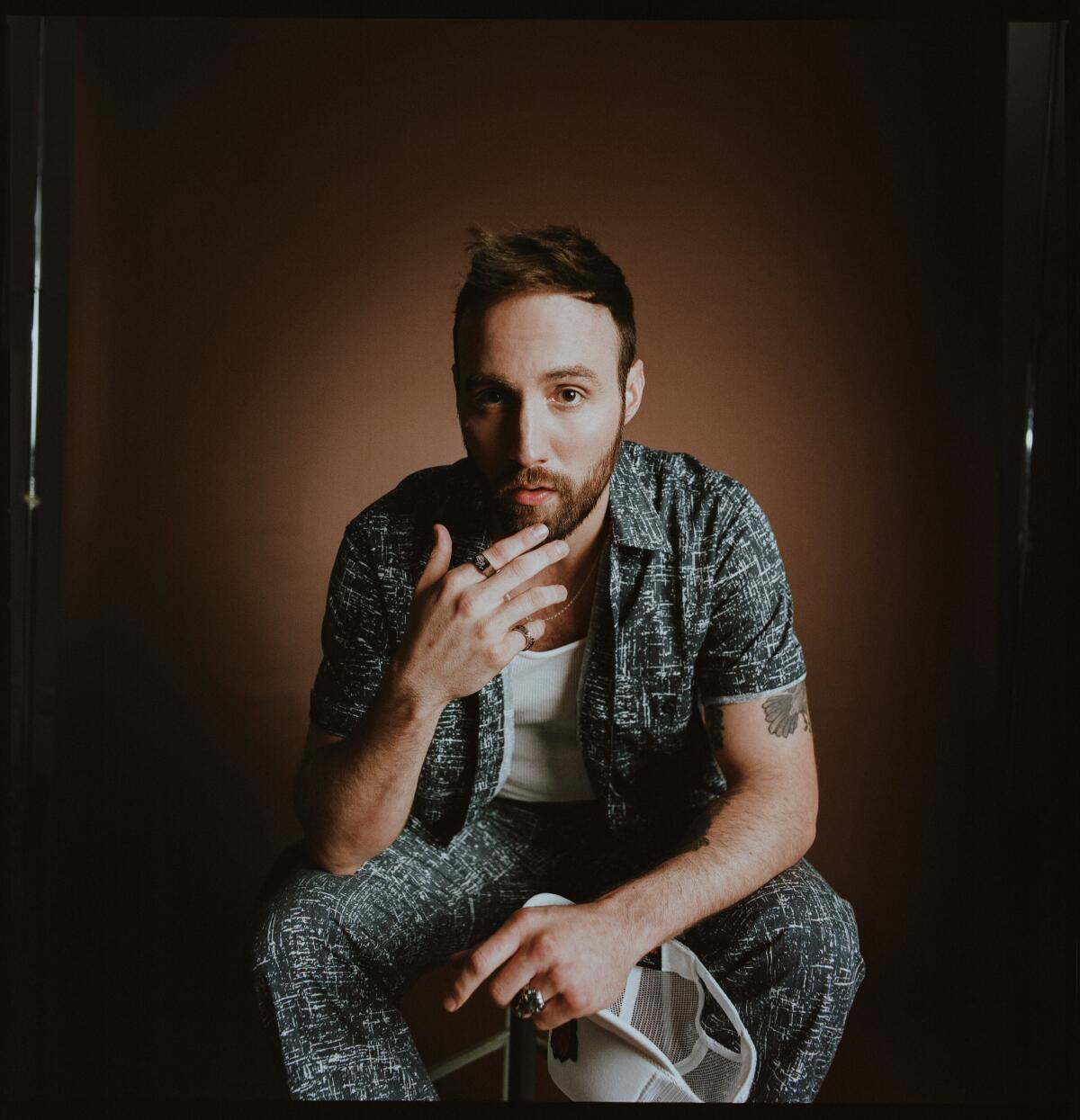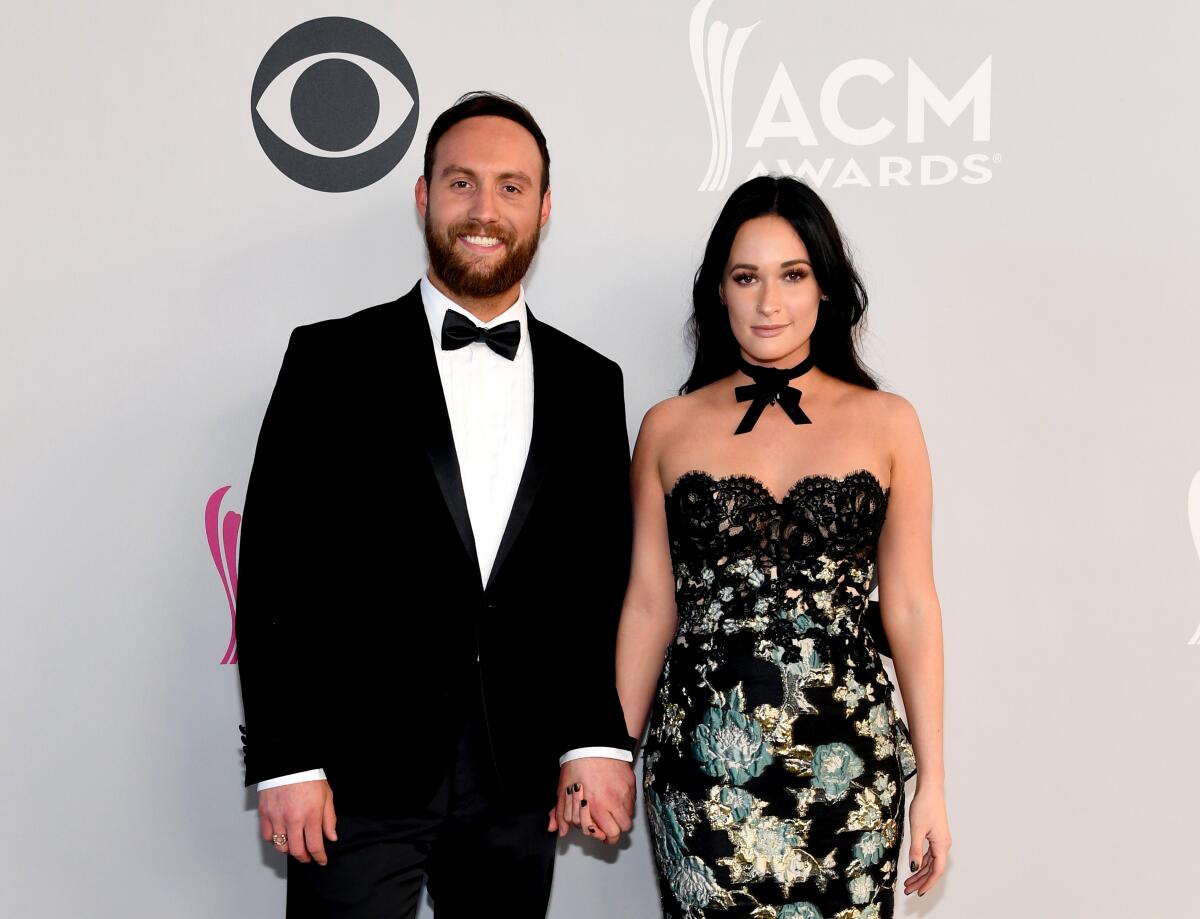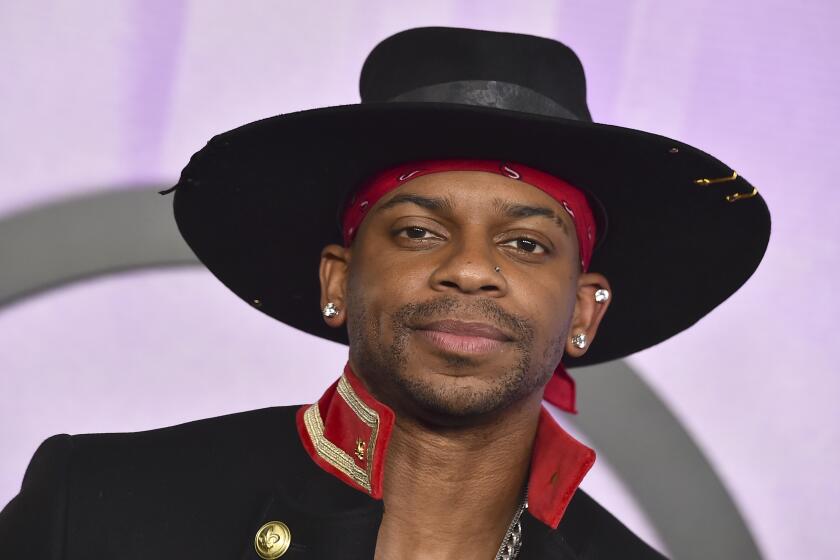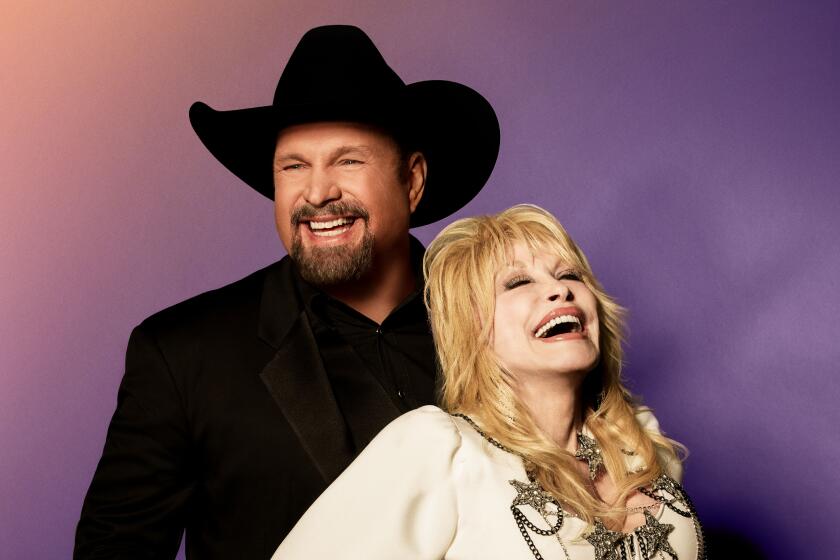Ruston Kelly’s new album isn’t really about his divorce from Kacey Musgraves: ‘It’s self-help rock, I guess’

- Share via
Ruston Kelly knows it sounds crazy — that it “kind of teeters on the edge of being unbelievable,” as he puts it.
But he insists it’s true: Nearly three years after his divorce from Kacey Musgraves, he’s still heard only a song or two from his famous ex-wife’s 2021 album “Star-Crossed,” on which the Grammy-winning pop-country artist chronicled the slow unraveling of their three-year marriage.
“I mean, I f—ing lived it, man,” says Kelly, himself a gifted singer and songwriter who made his name in Nashville. “So why do I need to listen to an after-the-fact version of the things that happened? I just wasn’t interested in putting myself in that position,” he adds. “I didn’t think it was wise.”
The healthier approach, in Kelly’s mind, was to pour his emotions into his own record: “The Weakness,” his recently released third LP, which opens with a mournful emo-grunge title track that has him admitting, “I woke up dreaming of her face again,” and closes with the haunted confessions of “Cold Black Mile.”
“It’s in the gray of the morning / It’s in the sound of her name,” he sings over a droning church organ, “It’s in the walls of that home where we lived / Where the love just couldn’t stay.”

Despite its many apparent references to the end of his and Musgraves’ relationship, Kelly, 34, says “The Weakness” isn’t really a divorce album. And in a sense he might be right: More than he recounts anyone’s failures or assigns blame for what went wrong — as Musgraves seemed to do in tunes like the witty and savage “Breadwinner,” about a guy “who wants your shimmer to make him feel bigger” — Kelly ponders healing and forgiveness as he seeks a path forward from personal calamity.
“These songs didn’t come from anger or jealousy or vindication or anything like that. They came from a place of meditation,” he says on the phone from a tour stop in Pittsburgh. (He’ll play the Fonda Theatre in Hollywood on Saturday night.) As an example he points to “Let Only Love Remain,” a strummy, blissed-out ballad in which he describes a breakup as a kind of necessary evolution of an indelible connection between two people.
“I don’t think it’s possible to land on a song like that unless you work the steps to get there,” he says, his language hinting at the struggles with substance abuse that he acknowledges may have played a role in his divorce.
Laughing, he adds: “It’s self-help rock, I guess.”
“The Weakness” is also a subtle reframing of Kelly’s music. Recorded in Los Angeles with producer Nate Mercereau, known for his work with Lizzo and Leon Bridges, it broadens the rootsy Americana of his first two LPs with elements of pop-punk and indie rock. At points the album looks back to the gleaming guitar music of the post-Nirvana 1990s, as in “Breakdown,” which evokes Goo Goo Dolls and Duncan Sheik — a fruitful setting, it turns out, for Kelly’s luscious rasp; at other points it nods to Kelly’s love of heavier acts like Crowbar and Slipknot, as in the title track, where his baritone Stratocaster is “literally in doom-metal tuning,” he says proudly.
“This is by far the best record Ruston has made,” says Chris Carrabba of Dashboard Confessional, a friend who’s performed and recorded with Kelly, including on a cover of Dashboard’s canonical emo hit “Screaming Infidelities.” “When you’re going through something tough, it’s hard to be graceful. But Ruston is somebody who’s put more time and effort than most people into how to process grief.”
Country singer Jimmie Allen has been sued by his ex-manager for alleged sexual assault, sex trafficking and battery. He says their relationship was consensual.
When Kelly and Musgraves announced that they’d filed for divorce in July 2020, the couple issued a joint statement that said their marriage “simply just didn’t work” and that they would “remain true friends for the rest of our lives.” Asked what he did with the harsher, messier feelings he surely went through after that — but before he achieved the clarity he details on “The Weakness” — Kelly says, “That’s assuming I had those feelings. Obviously, I’m human — there’s no way to be, like, complete emotional Iron Man. But I’ve stood by that statement the entire time, and I’ve never needed to waver from it. If there was any doubt in my mind whether anyone else did, I just didn’t really care.
“I’m not trying to sound heroic or anything,” he continues. “I just don’t have anything negative to say about her because nothing negative happened.” (In 2021, Musgraves told Elle magazine that she came to feel “lonely” in the marriage whose happy beginnings had inspired her 2018 album “Golden Hour.”)
“And that’s how I feel today, right now, sitting in this hotel room,” Kelly says. “I love her, and I want her to be happy. I truly do.”

Kelly says part of what enabled him to process his divorce the way he did was his decision to leave Nashville for tiny Portland, Tenn., 40 miles north of country music’s capital, where he cleared his head in an old house he bought and threw himself into restoring. But he also ties his perspective to his experience in recovery from addiction to cocaine and amphetamines.
“Learning restraint — that’s been very difficult,” he says. “When I was a kid, it was like, ‘You want a piece of candy? How about six bags of candy?’” Now, he understands the idea of “drawing boundaries for yourself” as key to his songwriting practice. “I don’t want to speak on something that matters so much to me in a very, very personal way,” he says, “unless I’m sure of what it is I have to say.”
Kelly, who was born in South Carolina but who moved frequently as a kid due to his dad’s job with a paper company, took up music just as an earlier plan for his future began falling apart. When he was 8 years old, Kelly followed his older sister into figure skating — watching Kurt Browning on TV skating to Pearl Jam’s “Black” had convinced him the sport was cool — and demonstrated so much natural talent that by the time he was 13 he was approached by a well-known husband-and-wife coaching team.
“I’ll leave their names out, but they were routinely putting out kids who were winning Junior Olympics — like three of them on the podium at the same time, year after year,” he says. The couple invited Kelly to move into their house in Michigan, where he soon discovered that the wife was involved in a sexual relationship with a fellow skater who was 17.
“The husband pretended like he didn’t know what was going on, but they had a 2-year-old daughter who started calling me Dad because I’d have to watch her while [the wife and the young skater] went on secret dates,” he says. “So I’m caught between this dilemma of ‘OK, this is so wrong,’ but if I tell my parents about it, then my dreams are over and I have to go back home.”
The stress of the situation led him to write his first song, “which was the first time I had a sense of what I would now call spiritual relief from some really deep-seated tension,” he says. He ended up testifying against the couple and returning to his parents. “And then I started playing football and listening to Dave Matthews Band,” he adds with a laugh. “My life changed instantly.”
ACM Awards co-hosts Dolly and Garth on their flirtations with rock ‘n’ roll, their favorite late-night hosts and a certain country alter-ego.
Kelly’s earliest success in Nashville came as a songwriter for stars like Tim McGraw and Kenny Chesney; he met Musgraves at a gig at the famed Bluebird Café in 2016, just months after an overdose that led him to kick hard drugs. The couple married in a 2017 ceremony that you can still watch in slickly edited form on the internet.
“Kind of weird,” Kelly says of the digital afterlife of his brief A-list celebrity. “There’s all kinds of s— if you Google that I have to take with a grain of salt.”
For “The Weakness,” Kelly wrote most of the songs in his house in Portland, and he and Mercereau played every note themselves, just the two of them in Mercereau’s studio; the intimacy of both setups seems to have been a balm for Kelly when he needed it most. One of the album’s highlights is “Michael Keaton,” which revolves around a bit of stoner philosophy he came up with one night after getting higher than he meant to while smoking a CBD joint.
“What if Michael Keaton killed himself in ‘Multiplicity’?” he sings, referring to the 1996 movie in which the actor’s character spawns a series of clones, “Would that be genocide?”
Mercereau says the song might seem like an outlier on an album otherwise defined by the heaviest of life events. “But we laughed so much during the making of this record that I was like, ‘This energy needs to show up,’” the producer says. “It’s actually incredibly important.”
Kelly’s barometer for whether a song is any good is his reaction the next morning when he listens to what he wrote. In this case, he remembers, “I played it back and I was like, ‘This is pretty sick.’” He laughs. “I mean, it’s stupid. But it means something.”
More to Read
The biggest entertainment stories
Get our big stories about Hollywood, film, television, music, arts, culture and more right in your inbox as soon as they publish.
You may occasionally receive promotional content from the Los Angeles Times.













